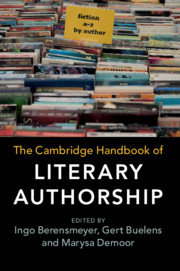Book contents
- The Cambridge Handbook of Literary Authorship
- The Cambridge Handbook of Literary Authorship
- Copyright page
- Contents
- Figures
- Contributors
- Acknowledgments
- Abbreviations
- Chapter 1 Introduction
- Part I Historical Perspectives
- Part II Systematic Perspectives
- Chapter 15 Literary Authorship in the Traditions of Rhetoric and Poetics
- Chapter 16 Authors, Genres, and Audiences
- Chapter 17 The Author in Literary Theory and Theories of Literature
- Chapter 18 Gender, Sexuality, and the Author
- Chapter 19 Postcolonial and Indigenous Authorship
- Part III Practical Perspectives
- Select Bibliography
- Index
Chapter 19 - Postcolonial and Indigenous Authorship
from Part II - Systematic Perspectives
Published online by Cambridge University Press: 07 June 2019
- The Cambridge Handbook of Literary Authorship
- The Cambridge Handbook of Literary Authorship
- Copyright page
- Contents
- Figures
- Contributors
- Acknowledgments
- Abbreviations
- Chapter 1 Introduction
- Part I Historical Perspectives
- Part II Systematic Perspectives
- Chapter 15 Literary Authorship in the Traditions of Rhetoric and Poetics
- Chapter 16 Authors, Genres, and Audiences
- Chapter 17 The Author in Literary Theory and Theories of Literature
- Chapter 18 Gender, Sexuality, and the Author
- Chapter 19 Postcolonial and Indigenous Authorship
- Part III Practical Perspectives
- Select Bibliography
- Index
Summary
Involved as they necessarily are in the social and economic contexts of literary publishing, authors can cater to the “dictates” of the market or set out to subvert these dictates. As Graham Huggan has argued with regard to Arundhati Roy, for instance, an author – in this case, an Indian or “postcolonial” author – may seemingly cater to the expectations of a Western audience by providing an “exoticist” description of a far-away country, but she may at the same time weave into her text a questioning of the politics of exoticism.1 At the same time, the reception of a given literary text may be informed not only by the politics of the literary marketplace or a mass audience, but also by the academic reception of this text. Here, too, authorship and scholarly criticism have often worked in tandem: literary authors have taken up, responded to, or resisted certain “turns” in criticism. Much has been made of this “symbiotic” relationship between literary writing and academic analysis, and it has often remained unclear whether writing precedes new developments in literary criticism or whether academic discussion in turn inspires new conventions of writing.
- Type
- Chapter
- Information
- The Cambridge Handbook of Literary Authorship , pp. 305 - 322Publisher: Cambridge University PressPrint publication year: 2019



